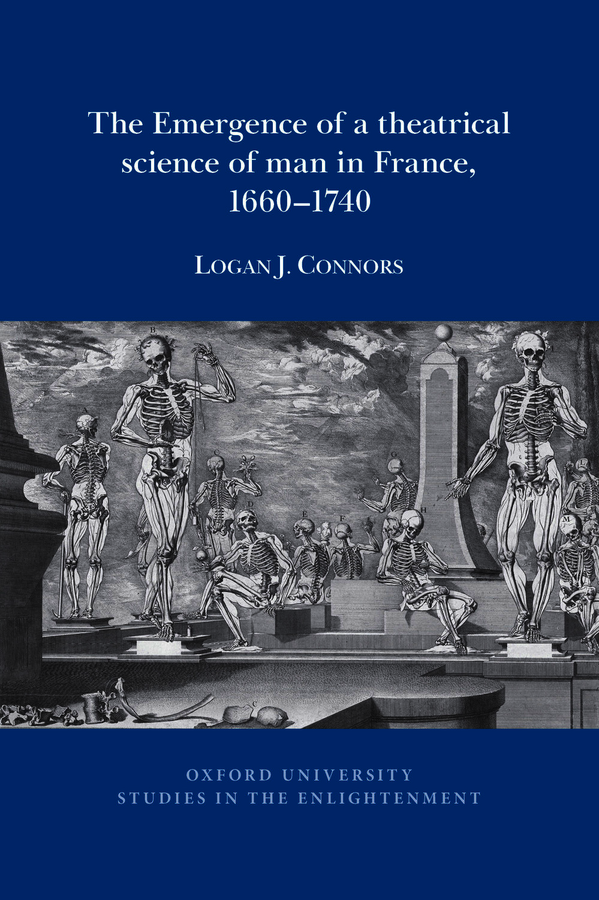
The Emergence of a theatrical science of man in France, 1660–1740
By Logan J. Connors
Oxford University Studies in the Enlightenment, 2020:01
ISBN: 9781789620382, 296 pages, £60.00
***
This book highlights a radical departure from discussions of dramatic literature and its undergirding rules to a new, relational discourse on the emotional power of theater. Grounded in contemporary and early-modern theories, this reassessment of the theatrical experience shows a broader change in conceptions of subjectivity, emotionality, and learning during the early French Enlightenment.
- The first book to highlight the theoretical and theatrical importance of a relatively understudied period in French cultural history.
- A theoretically informed history of the early modern debates on affect, learning, and the role of theater in society.
- Uses diverse sources, including sermons, government documents, plays, and theoretical treatises to describe the connections between theater and the emotions in early modern France.
Table of Contents
Acknowledgments
Introduction: theater, emotions, science of man
Diderot’s relational drama
From religious theaterphobia to theatrical innovation
Affect, intentionality, and the history of emotions
Chapter 1: Theaterphobia and the transformational power of performance
Anti-theatrical criticism: goals and strategies
Corneille, Nicole, and the reality of emotions
Learning dangerously from the passions: Pierre Nicole’s Traité de la comédie
Debating theatrical emotions in the wake of Nicole’s Traité
Chapter 2: “Que sur la superficie de notre cœur”: Jean-Baptiste Dubos’s theatrical emotions
Emotional debates: past and present
A different path to aesthetic appreciation
The political case for pleasure
Dubos’s cognitive-affective sequences
Chapter 3: Beyond affect: from Dubos’s “passions superficielles” to Houdar de La Motte’s “sentiments raisonnables”
La Motte, the Querelle, and the Regency
La Motte’s “sentiments raisonnables”
The dramaturgical power of intérêt
Chapter 4: From the page to the stage: La Motte’s theatrical inquiry into the emotions
Context and emotion in Les Macchabées (1721)
Intentionality and suspense in Romulus (1722)
Inès de Castro (1723) and the emotional politics of intérêt
Chapter 5: Strategic passions: Marivaux’s Moderne subjectivities
Marivaux’s trajectory from Moderne to bel esprit to scientist of man
Learning from the “organs”: Marivaux’s intuitive ethics
Sentimental strategies: Marivaux’s theories of emotion in Le Triomphe de l’amour (1732)
Chapter 6: Learning through multiplicité: emotion and distance in the comédie larmoyante
The decline and rebirth of Nivelle de La Chaussée’s emotional poetics
Meaning-making through the romanesque
The pièce-cadre: emotion, multiplicité, and spectatorship in La Fausse Antipathie (1733)
Conclusion: avant-gardes, emotion, and Enlightenment
Works cited
Index
***
Logan J. Connors is Associate Professor of Modern Languages and Literatures at the University of Miami. His next research project investigates connections between theater and the military in France and its colonies from 1680 to 1815.
The Oxford University Studies in the Enlightenment series, previously known as SVEC (Studies on Voltaire and the Eighteenth Century), has published over 500 peer-reviewed scholarly volumes since 1955 as part of the Voltaire Foundation at the University of Oxford. International in focus, Oxford University Studies in the Enlightenment volumes cover wide-ranging aspects of the eighteenth century and the Enlightenment, from gender studies to political theory, and from economics to visual arts and music, and are published in English or French.